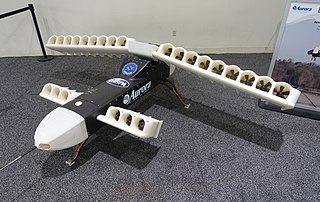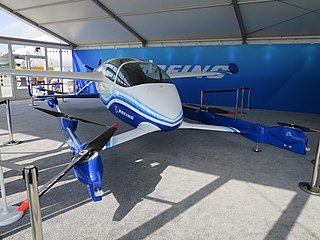
A vertical take-off and landing (VTOL) aircraft is one that can take off and land vertically without relying on a runway. This classification can include a variety of types of aircraft including helicopters as well as thrust-vectoring fixed-wing aircraft and other hybrid aircraft with powered rotors such as cyclogyros/cyclocopters and gyrodynes.

An air taxi is a small commercial aircraft that makes short flights on demand.

The Vertical Take-Off and Landing Experimental Aircraft program was an American research project sponsored by the Defense Advanced Research Projects Agency (DARPA). The goal of the program was to demonstrate a VTOL aircraft design that can take off vertically and efficiently hover, while flying faster than conventional rotorcraft. There have been many previous attempts, most of them unsuccessful as of 2015.
Urban air mobility (UAM) is the use of small, highly automated aircraft to carry passengers or cargo at lower altitudes in urban and suburban areas which have been developed in response to traffic congestion. It usually refers to existing and emerging technologies such as traditional helicopters, vertical-takeoff-and-landing aircraft (VTOL), electrically propelled vertical-takeoff-and-landing aircraft (eVTOL), and unmanned aerial vehicles (UAVs). These aircraft are characterized by the use of multiple electric-powered rotors or fans for lift and propulsion, along with fly-by-wire systems to control them. Inventors have explored urban air mobility concepts since the early days of powered flight. However, advances in materials, computerized flight controls, batteries and electric motors improved innovation and designs beginning in the late 2010s. Most UAM proponents envision that the aircraft will be owned and operated by professional operators, as with taxis, rather than by private individuals.
Lilium N.V. is a German aerospace company which is the developer of the Lilium Jet, an electrically powered personal air vehicle capable of VTOL flight.

The Lilium Jet is a prototype German electric vertical take-off and landing (eVTOL) electrically powered airplane designed by Lilium GmbH. A seven-seat production version is planned.

The Aurora XV-24 LightningStrike is an experimental unmanned aerial vehicle created by Aurora Flight Sciences and partners Rolls-Royce and Honeywell. It was developed for the Vertical Take-Off and Landing Experimental Aircraft program.
The Airbus CityAirbus is a multinational project by Airbus Helicopters to produce an electrically powered VTOL personal air vehicle demonstrator. It is intended for the air taxi role, to avoid ground traffic congestion.

The Airbus Vahana was an electric-powered eight-propeller VTOL personal air vehicle prototype, or eVTOL, financed by A³, by Airbus and Airbus Urban Mobility. The Vahana project started in 2016 as one of the first projects at A³, the advanced projects and partnerships outpost of Airbus Group in Silicon Valley. Airbus "envision[s] Vahana being used by everyday commuters as a cost-comparable replacement for short-range urban transportation like cars or trains". It was planned to be a part of urban air mobility. The project was finished in December 2019.

Joby Aviation is a United States venture-backed aviation company, developing an electric vertical takeoff and landing (eVTOL) aircraft that it intends to operate as an air taxi service. Joby Aviation is headquartered in Santa Cruz, California, and has offices in San Carlos, California; Marina, California; and Munich, Germany.
Volocopter GmbH is a German aircraft manufacturer based in Bruchsal and founded by Alexander Zosel and Stephan Wolf. The company specializes in the design of electric multirotor helicopters in the form of personal air vehicles, designed for air taxi use. The CEO is Dirk Hoke and chairman Stefan Klocke.

Vertical Aerospace Ltd. is an aerospace manufacturer based in Bristol, England. It designs and builds zero emission, electric vertical take-off and landing (eVTOL) electrically powered aircraft.

The Elroy Air Cargo is an unmanned cargo aircraft developed by American startup company Elroy Air, intended to replace land delivery trucks on inefficient routes with unmanned aircraft.

Beta Technologies, is a South Burlington, Vermont-based aerospace manufacturer developing electric vertical take off and landing (eVTOL) and electric conventional take-off and landing (eCTOL) aircraft for the cargo, medical passenger, and military aviation industries. The company has also developed a network of chargers which can supply power to their aircraft and other electric vehicles. Training programs for future electric aircraft pilots and maintainers are also provided.

The Boeing Passenger Air Vehicle (PAV) is an American electrical powered autonomous personal air vehicle prototype developed by the Boeing NeXt division of Boeing with the assistance of Aurora Flight Sciences.

The Pipistrel 801 eVTOL is a Slovenian autonomous vertical take-off electric aircraft for the air taxi role under development by Pipistrel Vertical Solutions of Ajdovščina. It was publicly announced at the Uber Elevate Summit in Washington, D.C., United States, in June 2019. The aircraft is intended to be supplied complete and ready-to-fly.

An electric vertical take-off and landing (eVTOL) aircraft is a variety of VTOL aircraft that uses electric power to hover, take off, and land vertically. This technology came about owing to major advances in electric propulsion and the emerging need for new aerial vehicles for urban air mobility that can enable greener and quieter flights. Electric and hybrid propulsion systems (EHPS) have also the potential of lowering the operating costs of aircraft.

The Wisk Cora, also known as Generation 4 and Generation 5, is an American autonomous personal air vehicle prototype previously developed by the Kitty Hawk Corporation, and subsequently by Wisk Aero.

Archer Aviation Inc. is a publicly traded company headquartered in San Jose, California, which is developing eVTOL aircraft.

Advanced air mobility (AAM) are systems that incorporate support for next-generation transport such as such as remotely piloted, autonomous, or vertical take-off and landing (VTOL) aircraft. This includes those powered by electric or hybrid-electric propulsion.


















